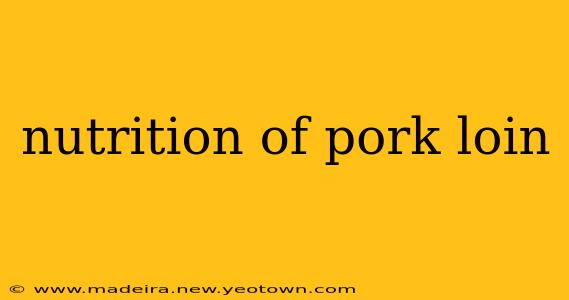Pork loin, that lean and versatile cut of meat, has often been unfairly maligned. For years, it carried a reputation for being fatty and unhealthy. However, modern pork production practices and preparation methods have dramatically altered its nutritional profile, revealing it as a surprisingly nutritious option for a healthy diet. Let's delve into the delicious details.
What are the Nutritional Benefits of Pork Loin?
Pork loin boasts a remarkable nutritional profile, especially when compared to other red meats. A 3-ounce serving of cooked pork loin offers a significant amount of protein, essential for building and repairing tissues, supporting a healthy immune system, and keeping you feeling full and satisfied. Beyond protein, it's a good source of several essential vitamins and minerals. Think of it as a powerhouse packed with nutrients to fuel your day.
How Much Protein is in Pork Loin?
This is a frequently asked question, and rightly so! Protein is a cornerstone of a healthy diet, and pork loin delivers. That 3-ounce serving mentioned earlier provides approximately 25-30 grams of protein—a significant portion of your daily recommended intake. This makes it an excellent choice for athletes, individuals seeking muscle growth, or anyone looking to maintain a healthy weight. The high protein content contributes to satiety, helping you feel fuller for longer and potentially aiding in weight management.
Is Pork Loin High in Fat?
This is where the outdated perception of pork comes into play. While pork loin can contain fat, it's significantly leaner than many other cuts of pork, and even compared to other red meats. The fat content largely depends on the cut and the preparation method. Opting for lean cuts and trimming visible fat before cooking drastically reduces the overall fat content. Choosing lean pork loin helps keep your diet heart-healthy.
Is Pork Loin Good for Weight Loss?
The combination of high protein and relatively low fat makes pork loin a surprisingly good choice for those aiming to lose weight. The high protein content keeps you feeling full and satisfied, reducing cravings and the likelihood of overeating. Furthermore, protein requires more energy to digest than carbohydrates or fats, boosting your metabolism slightly. However, mindful portion control and a balanced diet remain crucial for effective weight loss. It's not a magic bullet, but a helpful tool in your weight management strategy.
What Vitamins and Minerals are in Pork Loin?
Pork loin is more than just protein; it offers a range of essential vitamins and minerals. It’s a good source of niacin (vitamin B3), crucial for energy metabolism and healthy skin, and thiamin (vitamin B1), important for nerve function and carbohydrate metabolism. It also contains a good amount of selenium, an antioxidant that protects cells from damage, and zinc, vital for immune function and wound healing. Remember, a balanced diet incorporating various foods is key to obtaining all the nutrients your body needs.
How Many Calories are in Pork Loin?
The calorie count in pork loin varies depending on the cut, cooking method, and portion size. However, a 3-ounce serving generally falls in the range of 150-200 calories. This makes it a relatively low-calorie protein source compared to many other meats, contributing to its suitability for weight-conscious individuals. Always check the nutrition label of your specific product for the most accurate calorie information.
Conclusion: Embrace the Nutritional Power of Pork Loin
Pork loin has rightfully earned a place in the modern healthy eater’s diet. Its rich protein content, relatively low fat, and good source of essential vitamins and minerals make it a versatile and nutritious choice. By understanding its nutritional benefits and preparing it mindfully, you can enjoy this delicious and healthy meat as part of a balanced and satisfying diet. Remember to always choose lean cuts and trim visible fat before cooking for optimal health benefits.

